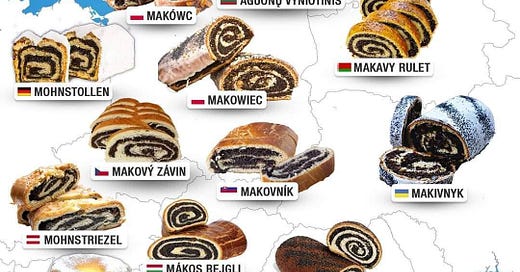Veto Corleone, the archirex
...also, why poppyseed rolls are important to understand Central Europe
Couple of days ago Telex (a popular independent portal) and Direkt36 (investigative journalists) published an article about Orbán’s geopolitical strategies. Their source is a leak from a briefing held some time ago in the Parliament. According to the article Orbán speaks more freely in these closed-door meetings and reveals some of his true motives.
So. Why is Orbán the “Veto Corleone” of the EU?
Apparently, he believes that a victorious Ukraine marching in the EU would tip the power balance and Eastern Europe would become closely controlled by the USA. This has to be prevented and our other “friends” (ie. China) shouldn’t be ignored. There is some merit in these words (although he draws the wrong conclusions) but this is not why I’m writing this post.
The rest of the article deals with Orbán’s maneuvers and negotiations. As it turns out he presented suggestions, strategies, and gave warnings to Macron, Scholz and others. He proposed anti-American, anti-German, anti-whoever alliances. He was of course ignored.
But again, this is not about what he proposed. The guy really believes that in the EU (500 million people) the prime minister of Hungary (9.5 million people) can just go to these conferences and come up with his bright ideas that other politicians should follow, because, well, these are the good ideas.
Part of the reason for that is that Orbán is no longer an elected politician. He no longer gets the feedback true elected politicians get and he believes that he is always right because he wins the elections.
So Orbán thinks he is special because he is a dictator, right? Well, not quite.
Orbán is also a typical Hungarian. How so?
Every small nation state in the Eastern part of the EU thinks that they are special. Take a look at this map. Do you see similar poppy seed rolls across Central Europe? You are wrong. What you see is the map of very special, one-of-a-kind national poppyseed rolls.
So Orbán thinks he is special because he is the prime minister of a special country? Yes.
If you ever get the chance to talk about politics with a Hungarian you will realize that we firmly believe that everyone in Berlin, Paris, Moscow, Brussels, Washington DC knows Hungary in detail.
More to that, the average Hungarian newsreader thinks that Hungary is a special, leading country in Central and Eastern Europe. We might be small but once we had this dominant kingdom and our opinion is still something to consider first.
Your average Hungarian newsreader has almost no idea about politics in the US, the EU or even the countries next door. If you would tell him that in a meeting amid the ongoing border deal quarrel Chuck Shumer and Mitch McConnell sat down to discuss the new board at the Momentum party and Klára Dobrev’s potential bid for prime minister in 2026, your Hungarian friend would believe it. We are important after all, aren’t we?
The Leading Kingdom?
Back in law school there was a lecturer who explained to us that in olden times international diplomatic protocol listed the King of Hungary as the “archirex”, the first in rank after the Holy Roman Emperor. I have no idea when this was true. But the guy seriously thought that our position as primus inter pares still exists. Not to mention the “lesser” countries around us.
After the loss of roughly 65% of the Kingdom of Hungary’s area after VW1, Hungary was in shock. Our coping strategy was to come up with a bunch of theories about how we were betrayed and overthrown by “lesser people” and how Hungary is still the leader, despite that loss.
This toxic nationalism was never truly abolished. Although such things are not said openly anymore, they remain in the minds of the average Hungarian. Therefore the prime minister of Hungary must come home from Brussels telling his voters that he was the main act there. His opinion was heard. His advice was followed. Even if this is a lie.








The most harmful thing about Orban's politics is that he acts like being part of alliances means that you have to take control over your allies and assert your will against the others, instead of seeking agreements for the benefits of the alliance as a whole.
Sure you meant WW1, not some German car...